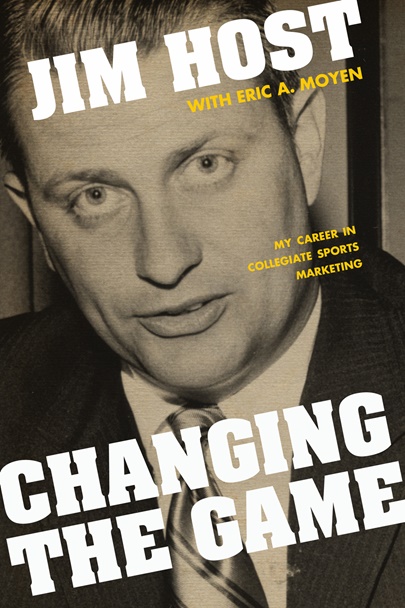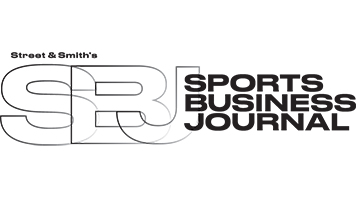As founder and CEO of Host Communications, Jim Host was a trailblazer in college sports marketing, pioneering the concept of bundled licensing, which encouraged corporate partners to become official sponsors of athletic programs across media formats. Host and his team developed the NCAA Radio Network and introduced what became known as the NCAA’s Corporate Partner Program, which engaged companies such as Gillette, Valvoline, Coca-Cola and Pizza Hut to promote university athletic programs and the NCAA at-large.
The following is an excerpt from his new memoir, “Changing the Game: My Career in Collegiate Sports Marketing” written with Eric A. Moyen.
Despite losing the UK [University of Kentucky] rights, the first few years of the 1980s were very successful for our company. However, I had been unable to get [NCAA Executive Director] Walter Byers to even engage in a discussion about corporate sponsors for the NCAA [basketball] tournament. Then, out of the blue, Byers called me. I remember picking up the phone and exchanging greetings. Immediately Walter asked, “Host, remember the idea you had about corporate sponsors that you shared with me at the Union League in Philadelphia?” I said, “Yes, sir.” He responded, “Be in my office tomorrow at 9. I want to talk about it.” As usual, he didn’t give me an opportunity to plan ahead or arrange my schedule. As always, I said, “Yes, sir.” I caught the first flight out of Lexington [Ky.] that afternoon so I could be in his [Mission, Kan.] office the next morning.
I knew that the College Football Association had challenged Byers and the NCAA over football television rights. I was unaware, however, that Byers had secured a CFA bulletin written in January 1982 in which the CFA’s head, Chuck Neinas, suggested changing the name to the College Sports Association to allow the organization “to address issues related to basketball and other sports.” As Byers stated in his own memoir published years later, “The CFA strategy centered on removing the NCAA football from television and then undercutting the NCAA in basketball. Since about 75 percent of its income was generated by the … tournament, the NCAA would be fatally crippled.” Byers saw signs of a potential coup and needed corporate sponsors to make basketball too valuable for NCAA institutions to defect. NCAA tournament teams already received healthy payouts, but Byers was ready to up the ante.
When I walked into Walter’s office, he was holding the letter I had written about corporate sponsors — the one he had told me not to bother writing. He looked at me and said, “Host, let me get this straight. Are you telling me that we are not talking about putting any company signs in the venues of the NCAA tournament?” I said, “No, sir.” Walter had always made it clear that he wanted the NCAA tournament to resemble the Olympics or the Masters golf tournament, without any banners or advertisements at the events. Then he asked, “How can you pull this off? It sounds like you’re trying to sell air.” When he said that, I knew I needed to reframe my argument. So I said, “Walter, this is a way of building the brand of the NCAA and the Final Four. We can actually get large corporations to pay you and, at the same time, go out and promote the NCAA tournament.” I explained that that companies would be willing to use the NCAA logo and the term “Final Four” to promote their products.
Walter looked at me and asked, “How will putting the logo of the NCAA on some label help sell a product?” I told him that when I worked for Procter & Gamble, everyone in sales was always looking for some sort of promotion to secure a competitive advantage. I suggested to Walter that Gillette might be a prime target for NCAA sponsorship because it spent a lot of advertising dollars during sporting events. My friend Gordon Wade, whom I had helped train at P&G, had contacts at Gillette. If I could get an “in,” I thought I could convince Gillette to sign on as the first corporate sponsor because of the marketing edge it would offer. Walter asked me how much I thought a corporate sponsor would pay. I said, “My best guess is that I could sell a three-year sponsorship for $250,000 per year.” I also emphasized that each sponsorship would be subject to NCAA approval. When Walter asked how much it would cost the NCAA or my company, I reemphasized, “Walter, they are going to pay the NCAA to use your logo and fan base to sell their own products!”

I explained again that a corporate sponsorship would not cost the NCAA anything. For instance, if a company wanted 10 tickets as part of each deal, it would pay the sponsorship fees and the ticket costs. I thought the tickets would be an essential selling point for the corporate sponsors. They could put “Win a trip to the NCAA Final Four” on their product packaging. They could tell a grocery store chain like Kroger that the store that sold the most Gillette razors during the month leading up to the event would win an all-expense paid trip to the Final Four. In addition, I would give sponsors airtime for radio commercials on the NCAA Network as well as key print ads in the official programs. Walter said, “That might work.” I replied, “I think it can work, but I need your permission.” Walter said, “I tell you what we’ll do. You go out and get the first sale, and we’ll split the proceeds fifty-fifty. However, you need to pay your expenses, and whatever sponsors you do land, you will be required to service them.” I said, “That sounds fair to me.”
I planned to contact Gordon Wade first. When I worked for P&G in the 1960s, it operated a fast-track management program for young, talented Ivy League graduates whom the company intended to promote to corporate headquarters. P&G assigned several trainees to me during my time at P&G, but Gordon was probably the brightest. Gordon later became a leading consultant for major global corporations. He had connections with everyone, and I knew he would provide sound advice.
Before I could call Gordon, he called me just before I left for the Final Four in New Orleans. He wanted to take some friends to the horse races at Keeneland and asked if I could get him some good seats. He liked to invite friends to attend the races at Keeneland during the day and play poker at night. I promised I would find him some seats and then shared my plan to develop corporate sponsors for the NCAA. He said, “That’s a hell of an idea. I’m going to be staying at the Marriott in Lexington when we visit Keeneland. Come see me and we can discuss the details.” So I agreed to visit.
We spent a few hours at the Marriott one morning, and I elaborated on my strategy. Gordon provided some excellent advice for negotiating with Gillette. The company ran promotions with Major League Baseball through the World Series and spent money on marketing with the NFL through the Super Bowl. However, the company had “dead time” on the calendar during the spring, and an NCAA corporate sponsorship would fill that gap. That would be my selling point. Gordon then connected me with Bill Ryan, who oversaw the personal care products division at Gillette. After sharing my plan with Ryan, he invited me to Boston to make a sales pitch.
Before I made the trip, I called my friend and longtime NTBA colleague Bruce Beckham. Bruce lived just outside of Boston and was a huge Red Sox fan. He said, “You need to see a game with me!” I had never been to Fenway, so I gladly agreed. …
The day after the game at Fenway, Bruce accompanied me to Gillette’s headquarters, where we met with Bill Ryan and two of his associates from Gillette’s razor division. These were the days before PowerPoint, so I started pulling out some whiteboards while providing some background on the NCAA’s basketball tournament. All at once Bill interrupted me and said, “Jim, why are you here?” So I cut to the chase: “I want Gillette to be the first-ever corporate sponsor of the NCAA tournament.” Bill asked, “What does that mean?” I went through my sales pitch about Gillette needing a marketing strategy during the “dead” spring months and how the growth of the men’s basketball tournament and the official advent of the Final Four provided evidence that a corporate sponsorship was a wise financial investment.
They seemed to be with me up to that point, so I said, “You will get to use the NCAA and Final Four logos, be the exclusive product in your sales category, and you can purchase 20 NCAA Final Four tickets for promotional purposes. All your artwork will have to be approved by the NCAA.” Bill asked, “How much will it cost?” I responded, “Half a million dollars per year with a three-year contract, which will increase slightly along with the consumer price index.” He said, “Fine, we’ll take it.” I was elated but wished I had started with a higher asking price. We shook on the deal, and I said I would get a contract drawn up and send it to them.
When we walked out, my friend Bruce Beckham, who had witnessed the whole thing, asked, “Do you think you undersold it?” I said, “I have no idea. Nothing like this has ever been done, so I’m not sure.” Then he asked, “Who else are you going to try to get?” I said, “Come with me to my hotel room, and let’s see if I can sell another one.” I then called Carl Frey, who was the senior vice president for marketing at Valvoline, a Lexington-based oil company that sponsored a lot of motorsports, including NASCAR. I basically gave Carl the same pitch I had just made to Gillette. I added that the 1985 Final Four would be in Lexington, so Valvoline would have an opportunity to capitalize on the event. With virtually no hesitation he said, “I think I’ll do it.” I told Carl that Gillette was the one corporate sponsor ahead of Valvoline, but the two companies were in no way competitors. Then I asked him to be patient while we hammered out all the details with the NCAA.
When I got back to Lexington, I called Byers and said, “Walter, I’ve got two sponsors!” He immediately asked me, “How much money did you get?” I responded, “Half a million dollars annually for each one with a three-year contract.” Byers said, “That’s more money than I ever imagined!” I let him know that I would hire an attorney in Lexington to help us draft the contracts.
Original Article: https://www.sportsbusinessdaily.com/Journal/Issues/2020/03/09/In-Depth/Host.aspx

